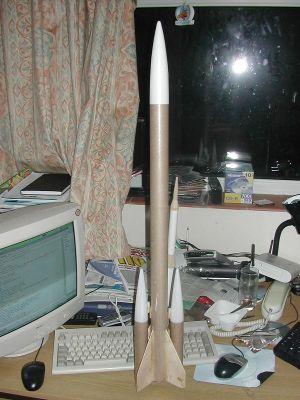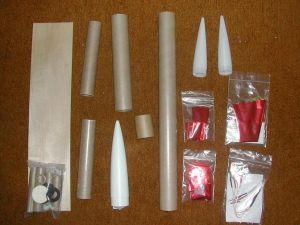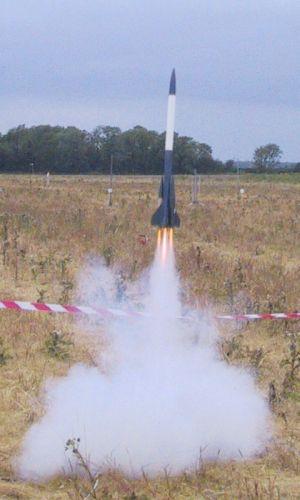RocketHead Rockets Gamma III Optimized
RocketHead Rockets - Gamma III Optimized {Kit}
Contributed by Philip Handley
| Construction Rating: | starstarstarstarstar_border |
| Flight Rating: | starstarstarstarstar_border |
| Overall Rating: | starstarstarstarstar_border |
| Manufacturer: | RocketHead Rockets |
| Style: | Cluster |

Brief:
A unique three motor parallel staged rocket.
Construction:
The Gamma III came in the usual clear plastic bag packaging with five smaller
packages in addition to the tubes, nose cones, and fin stock. The four body
tubes were the brown Estes type, but the three nose cones were rather thin
plastic, which made for rather weak points to screw in a screw eye (the kit now
comes with balsa cones). A Rockethead Rockets 15" mylar chute, and two
mylar streamers were also included. The recovery items were very high quality.
A DMB Rocketry three motor Clip Whip had been thrown in as well. Basswood fin
stock and fiber centering rings round the kit off nicely.
Construction is fairly straightforward for the experienced modeler. The included instructions were clear and contained photos and line drawings to illustrate the steps. Templates were on a separate sheet. Cutting the fins out of the basswood stock was a little tricky with a hobby knife, but the method mentioned in the instructions works well. I used medium CA throughout the build and filleted the fins with epoxy. This is definitely a builder's kit as you have to cut dowels, body tubes, and launch lugs.

Finishing:
There are no special finishing requirements nor decals included with the kit. I
went with purplely-bluey on the sustainer and green on the fins and pods.
I'm giving this four and a half out of five. It just misses out on full marks because of the nose cones.
Construction Rating: 4 out of 5
Flight:
The first flight of the Gamma III was at BigEARS '05 in Cambridge, England. I
loaded it up with a D12-5 and C6-3s in the boosters. Wadding was inserted into
the boosters and sustainer. I decided to use an 18" nylon chute in the
sustainer due to the hard ground. I hooked up the DMB clip whip to the
igniters, and went out to the pads. The wind was gusting around 7-10mph, and I
was a bit nervous about launching but I went for it anyway. After a quick
countdown, the rocket left the pad with all three motors burning then shot over
towards the camping area, going close to horizontal. It managed a tight loop
before it hit apogee then the boosters ejected at about 20ft above ground,
while the sustainer hit the ground and ejected almost simultaneously. An
exciting flight but not what I had in mind! After a 20 minute search of the
field for the boosters (as the crops were at that annoying height when it's
easy to lose smaller rockets in), we managed to find one booster and the nose
cone from the other, which had separated and taken the streamer with it. The
sustainer was found a little further down, with the nosecone about 4" into
the hard mud. The top of the body tube was crimped beyond repair and the motor
mount had moved a couple of inches into the body. It seemed the crash had been
caused by a short launch rod, the wind, and late ignition of one of the
boosters, which was confirmed by looking at the spent igniters: two were
completely burnt up but the other one still had most of the paper on it.
 After a quick rebuild, it was ready for another flight, which
took place at UKRA '05. It was loaded up again with a couple of C6-3's and a
D12-5. This time, I used Quickmatch (fast burning fuse ignited by an Estes
igniter) to light the motors, which practically guaranteed simultaneous
ignition of all the motors. After worrying about flying it in the high wind
(higher than BigEARS), I loaded it up onto a pad with a long rod. All three
motors lit at the same time thanks to the Quickmatch and the Gamma shot off the
pad, barely weathercocking. Right on cue, the boosters ejected and separated
from the sustainer. One booster kicked its motor, which was my fault for not
securing it properly, and both nose cones separated from the tubes. The
sustainer continued skyward for 3-4 more seconds, and then ejected right on
apogee. All parts were recovered nicely.
After a quick rebuild, it was ready for another flight, which
took place at UKRA '05. It was loaded up again with a couple of C6-3's and a
D12-5. This time, I used Quickmatch (fast burning fuse ignited by an Estes
igniter) to light the motors, which practically guaranteed simultaneous
ignition of all the motors. After worrying about flying it in the high wind
(higher than BigEARS), I loaded it up onto a pad with a long rod. All three
motors lit at the same time thanks to the Quickmatch and the Gamma shot off the
pad, barely weathercocking. Right on cue, the boosters ejected and separated
from the sustainer. One booster kicked its motor, which was my fault for not
securing it properly, and both nose cones separated from the tubes. The
sustainer continued skyward for 3-4 more seconds, and then ejected right on
apogee. All parts were recovered nicely.
Take-off picture by Dan Westley
Flight Rating: 4 out of 5
Summary:
An excellent kit, with very exciting flights. I was slightly let down by the
weak nose cones but that has been fixed with the Rockethead version of this
kit.
Overall Rating: 4 out of 5
 |
 |